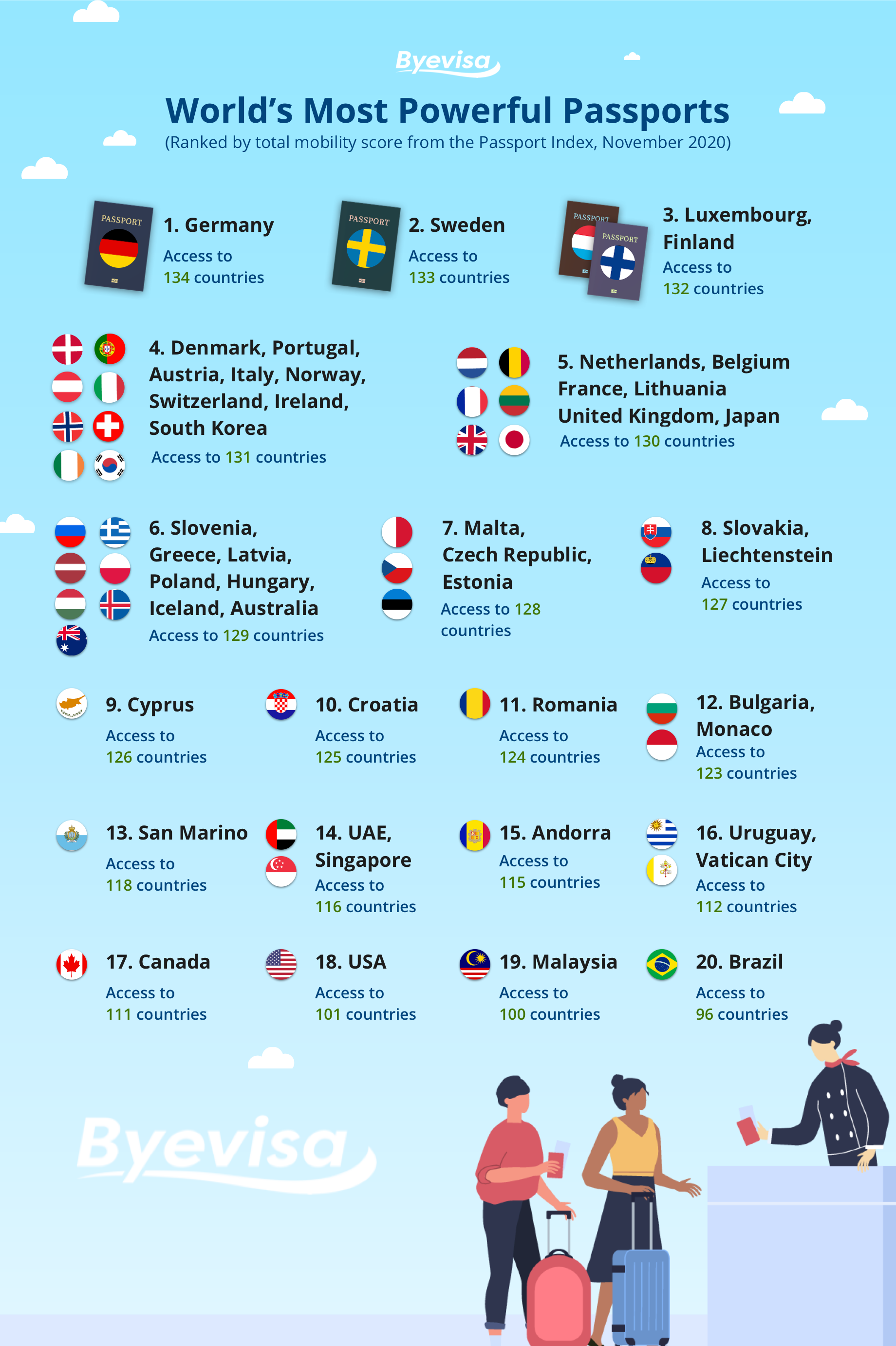Would you rather have a passport full of stamps than a house full of stuff? A passport is a traveller’s most sacred possession. This little booklet has the potential to take you places that can change your life forever.
But which passport is the strongest? Which nationality can explore the largest number of destinations visa-free? The Passport Index is an interactive global ranking tool that uses real-time data to track just this.
As you’d expect, this data is constantly changing, as new agreements are forged and the world’s circumstances change. From week to week and year to year, some passports become more dominant, while others lose some of their strength.
Visa policies are in a constant state of flux. Just like a great leader, however, a stable passport is consistent even in volatile times.
Passport Index data shows that if you have a German passport, the world really is your oyster.
Germany has been near the top of the passport league table for the last decade and right now, it’s reigning champion.
The infographic below gives you an idea of how the Global Passport Power Rank stands at the end of 2020. This ranking may surprise you!
Feel free to share this infographic on your website by copying and pasting the following code:
Contents
100 Years of Passports
When you are planning a trip abroad, your passport is the one item you cannot forget. But what are the origins of this travel document?
The concept of a global passport standard came about after World War One. In 1920 the League of Nations changed the face of travel forever by introducing a worldwide standardised passport design.
A century later, the basic booklet design remains the same. However, each country’s passport has its own personality. If you shine Scandinavian passports under UV light, for example, you can see the Northern Lights on the paper. The power the document holds also varies significantly depending on where you’re from.
European Union Passports Take the Lead
Germany is part of the European Union and its citizens have the right to travel, live and work in any EU country. Germany continues to form treaties with many other nations, who seem to be impressed with its government’s handling of recent events.
Germany was one of the 6 original members of the EU, entering in 1958. Other European countries like Sweden, Finland, Luxembourg and Spain also feature high in the world’s most powerful passport ranking. This is no coincidence. Being part of the European Union gives you visa-free access to the 26 other member nations.
The UK is no longer part of this club and the influence of the British passport has started to slide after Brexit. By comparison, neighbouring Ireland remains part of the EU and features higher in recent passport rankings.
Germany was also one of the 5 founding countries of the Schengen Agreement signed in 1985. Schengen refers to the EU passport-free zone which covers most of the European countries. It is the largest free travel area in the world.
Glide Across Borders With a Diplomatic Passport
There is one passport that will always be mightier than a regular passport, regardless of your nationality: the diplomatic passport! The passport index does not take these into account as it is just for standard travel documents.
A diplomat’s role is to maintain political, economic and social relations with other nations, and this important job earns you certain (sometimes controversial) privileges. If you hold this passport, you are exempt from prosecution and paying taxes in your host country!
If you travel on a diplomatic passport, you get the real VIP treatment. There are sensational stories in the press about diplomats getting passports for 50 family members and enjoying wild weekends abroad. Some are true, others not so. Diplomatic passports are technically granted only to those travelling on official business to represent their country overseas.
The only person in the world who doesn’t need a passport when travelling abroad is Queen Elizabeth II of the UK! She is also the only person in Britain who is allowed to drive without a license.
Who Decides Who Can Visit Where?
There are many nuances to visa rules that can cause confusion for travellers. Some of the visa exemptions may not make sense on the surface, but everything is political and it is often about who the country’s leaders know when it comes to visa agreements.
Americans can travel to Armenia visa-free for 180 days, whereas Canadians require an eVisa. The Irish can go to Zambia without a visa for 30 days, whereas Brits require a Visa on Arrival or an eVisa. The Portuguese have to obtain a visa to visit Nauru, whereas Spaniards can get a Visa on Arrival.
It will be interesting to see, for example, how US visa rules change following the 2020 election.
The Future of Passports
Germany might be top of the ranks right now, but will it stay there? Power is precarious and it depends on how you define it. One index might base a strong passport on its global mobility, another on different criteria. This data will always fluctuate. With the new vaccines emerging, it is likely to oscillate even more.
And what about passports, will these travel documents stick around? E-visas are already replacing paper ones and the majority of passports nowadays have an electronic chip with biometric information that is used to authenticate the holder’s identity.
Thanks to the increasing digitalisation of the travel industry, physical travel documents may one day become a thing of the past. Soon, facial recognition technology and fingerprint scanners may eliminate the need to carry a paper passport at all!


